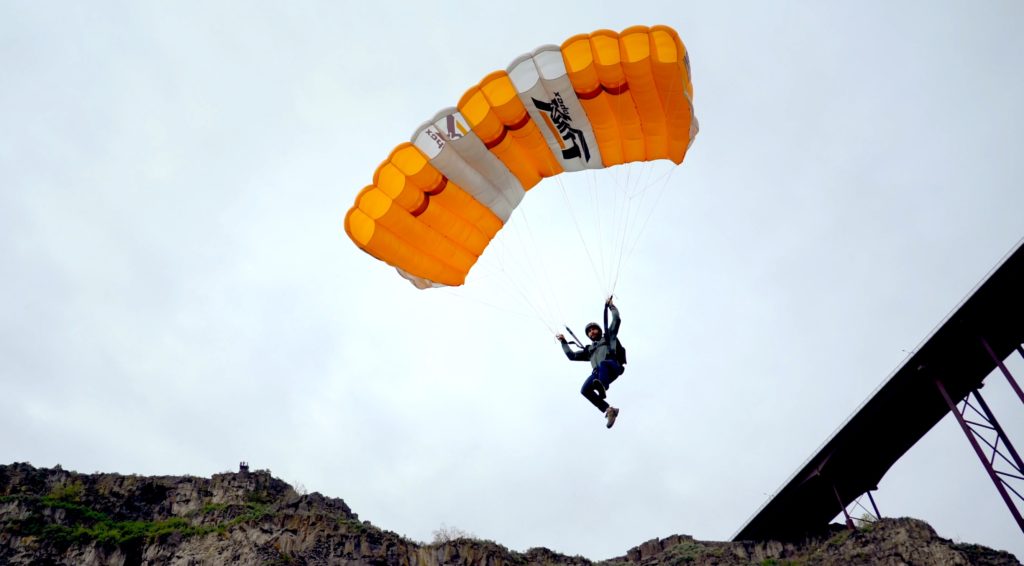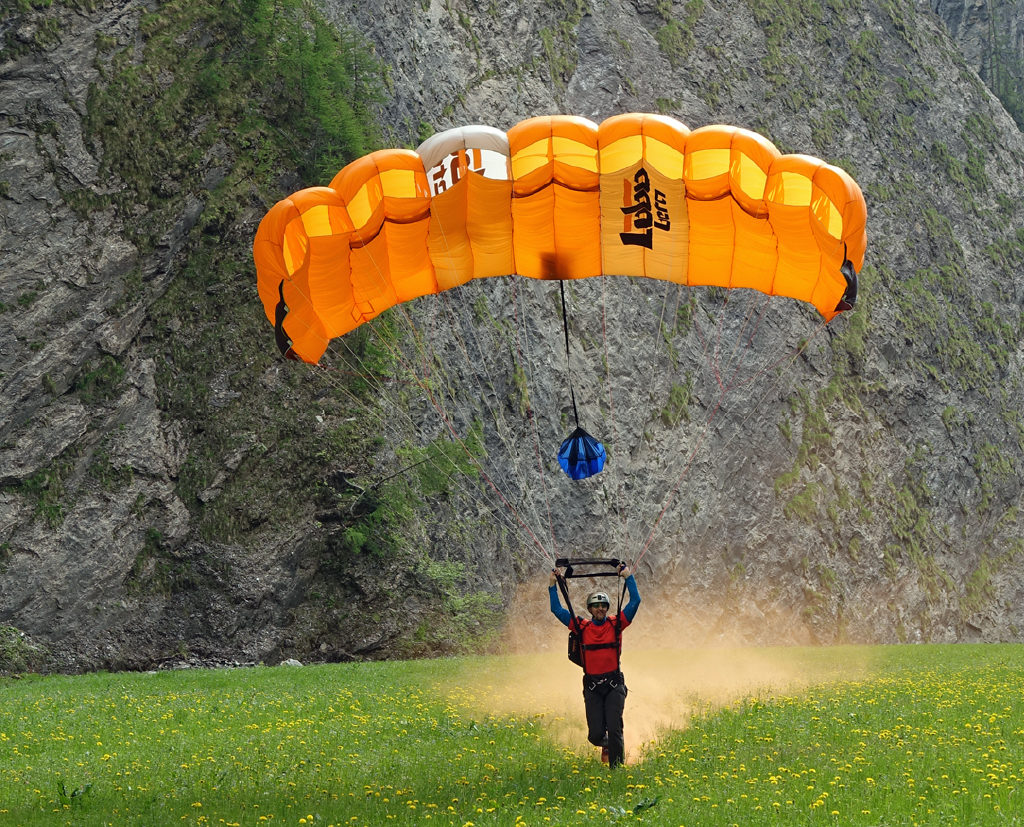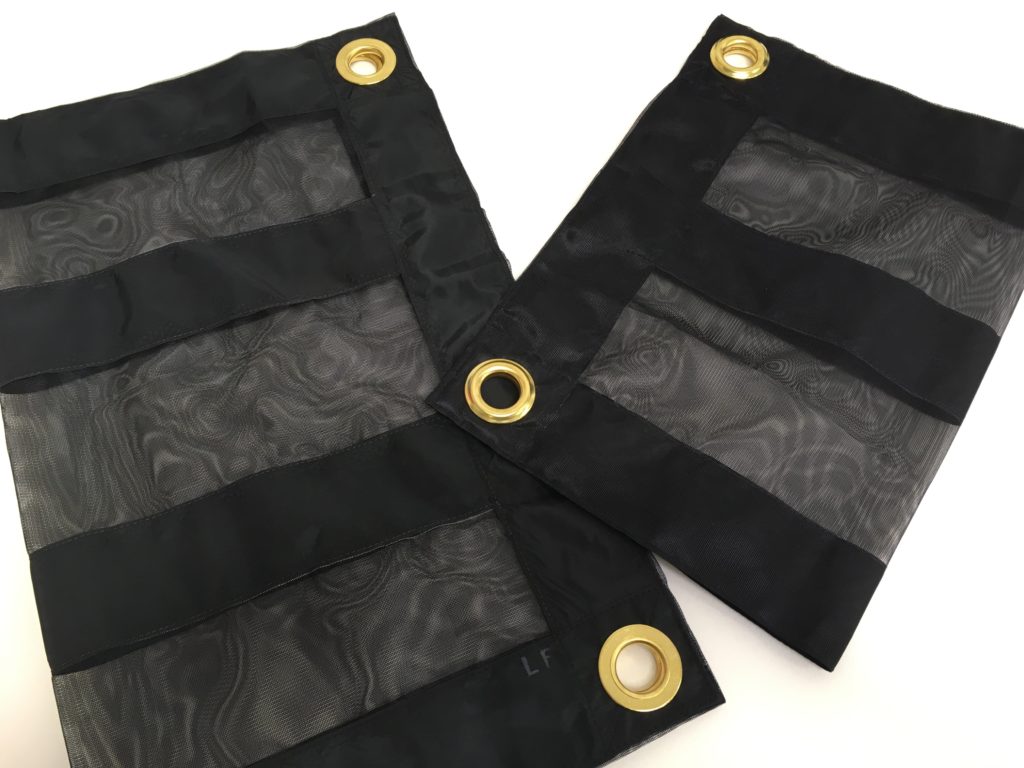Lightweight and “UltraLite” gear is all the rage these days in BASE. Every day we’re answering questions about “UL” canopies and containers. Are they durable? Are they safe? Are they worth the extra cost?
We would like to share our experience with lightweight and “UL” materials to better inform your next gear purchase because ultimately, there are pros and cons to most pieces of equipment. What’s best for one jumper might be a sub-optimal choice for another. Lightweight options, while an awesome technological advancement for the sport, are not always the best solution for everyone and we hope this article will better inform you as a jumper.

-Walker Jezek flying an Apex UltraLite Lynx, made with UL fabric. — by Negative4 Productions
Lightweight and “UltraLite” Parachutes:
Our parachutes make up the majority of the total weight of our BASE systems, so we have the most to gain from lightweight canopies.
When Apex BASE first started exploring the potential of UltraLite fabric in 2006 we conducted a fun experiment. We took several large samples of fabric as well as similar samples of traditional F-111 (0-3 cfm) parachute fabric and left them on the roof of our Southern California shop. We left the fabric up there for just over six months, taking it down every month to conduct porosity and strength tests. What did we find after months of exposure to the California sun, wind, dust, and (gasp) even occasional rains?
From a structural standpoint UL fabric breaks down at approximately the same rate as F-111. We found no meaningful difference in the way the two fabrics held up structurally (or broke down, depending on how you’d like to frame it). However, we were very surprised to learn that UL held up better when measuring the porosity of the fabric. This means that an UltraLite canopy could potentially last longer than an F-111 canopy given the gear is treated well and protected from abnormal wear and tear.
These results are in-line with our in-the-field findings. When UL was first introduced we still expected a notable reduction in longevity, but 12+ years and many thousands of jumps have proven our hypothesis to be incorrect as UL continues to stand the test of time. We have canopies in the field constructed entirely of UltraLite fabric (from nose to tail) with hundreds of jumps still opening, flying, and flaring just as strong as their F-111 counterparts.

Canopies built entirely of PN-9 (UL), from nose to tail, still fly and flare beautifully even after hundreds of jumps due to the durability and longevity of lightweight fabric.
To the touch it does seem intuitive that UL is a bit more fragile than F-111. So while we haven’t conducted any scientific “Cactus Tests” our in-the-field experience has shown that UL is more susceptible to damage when being dragged over sharp objects, run over by cars, and attacked by unruly house pets. Yes, all of these things have actually happened.
While weight savings will depend on canopy design, we know that Apex UltraLite canopies will typically enjoy a reduction in weight and pack volume of roughly 21% compared to their F-111 counterparts. Additionally, canopy design itself can play a large role in weight and volume reduction. ZP noses, “slat” systems, line weight, and vent configuration can add meaningful bulk and weight to a canopy regardless of the fabric used. This is not to suggest that these design elements do not make meaningful changes to flight characteristics, but in a discussion about lightweight designs we feel this is worth noting. If you really want to reduce the load on your back there’s more to it than fabric selection.
UltraLite Fabric and Canopy Performance
Aside from the weight and bulk differences, we have noticed some performance differences with UL fabric. Most of these differences will be intuitive in retrospect, but aren’t on the top of everyone’s mind when tinkering with a canopy designer online.
Lightweight canopies can open harder. Especially when taking deep slider-off delays or if you’re jumping a small (220 and under) canopy. This stands to reason as the fabric weighs less and requires less airspeed to inflate. UL has been the fabric of choice for “ultra low” jumpers for years for exactly this reason. It opens faster on very low objects, and that’s great, but it might not be as awesome if you love taking 3+ second delays slider-off on a 200 square foot canopy. For deeper delays we recommend packing appropriately, and if you’re jumping a small lightweight canopy at terminal airspeeds you should consider using a slow slider.

If you’re jumping a small (220 and under) lightweight canopy, consider using a Slow Slider to manage opening speeds.
During flight, we have experienced no meaningful differences in the performance of UL. It glides, flies, and flares just as well as F-111. Oh, and packing UL fabric is a dream. The lightweight fabric lays down flatter and with less bulk which makes getting UL canopies into the container much easier than canopies built with mixed fabrics or entirely of F-111.

UL fabric is less bulky and lays down flatter, making it much easier to fold into your container.
Cool story. What should I get?
There are a lot of reasons to choose both UL AND F-111, but here are a few scenarios we run into on a regular basis:
- You’re buying a large canopy. A 21% savings in weight and volume makes a big difference on a 240 square foot canopy. It makes an even bigger difference as you start to approach, and pass, 300 square feet. If you’re getting a 280 or larger, consider UL.
- You’re buying a small canopy. As canopy size decreases your opening speeds can increase. Consider going with F-111.
- You’re really hard on your gear, and/or love to land next to sharp objects and cacti. Does your canopy regularly lay down in sharp bushes, or over fences, or on top of porcupine families when you land? Consider F-111.
- You’re OCD about keeping your gear neat, clean, and meticulously maintained. Go ahead and get UL. You deserve it, and we’d expect you to get the same service life out of your lightweight canopy that you would from F-111.
- You’re a WS BASE jumper/tracker. Long hikes are a lot nicer with a lighter load. And steep flights are a lot cleaner with a low profile rig on your back. Consider UL.
- You’re an avid “ultra low” jumper. As mentioned above UL will open faster. If you pride yourself on freefalling your local “PCA only” object…then UL is the way to go.
If you have any questions please do not hesitate to reach out to Apex BASE. We’ll happily chat with you about your environment and jumping style to determine which canopy fabric is right for you!
